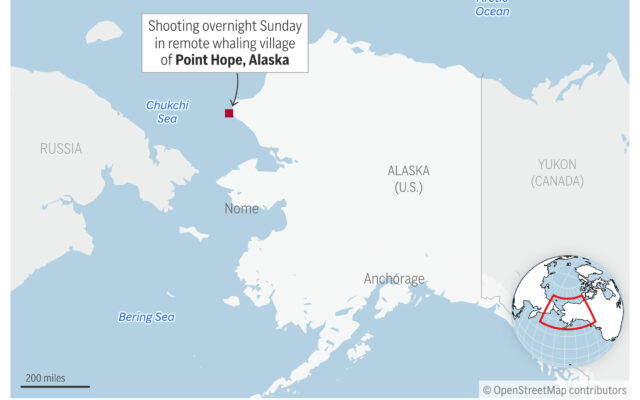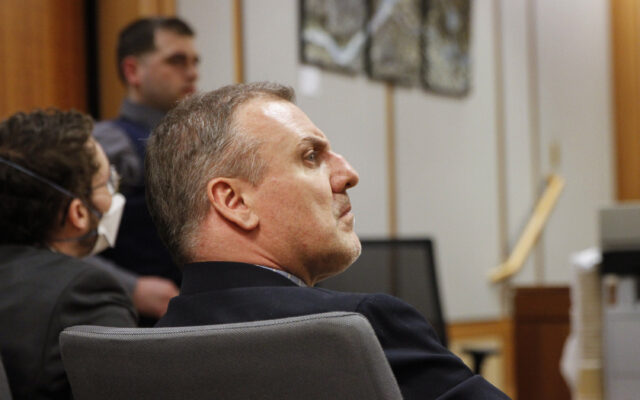Shooting stuns indigenous whaling village on Alaska’s desolate North Slope

ANCHORAGE, Alaska (AP) — A shooting that killed two adults and severely wounded two others has stunned a tiny Alaska Native whaling village above the Arctic Circle, where parents were told they could keep their children home from school Tuesday to hug them.
A 16-year-old boy has been charged as an adult with first-degree murder and attempted murder in the late Sunday shooting in Point Hope, a remote Inupiat whaling community on Alaska’s northwest coast, bordering the Chukchi Sea.
Guy Nashookpuk was scheduled to make an initial court appearance by telephone Tuesday, said Nome District Attorney John Earthman.
State law allows minors 16 and older to be tried in adult court on murder charges. The teen did not have a lawyer listed in online court records. The public defender for northwest Alaska did not immediately return a message seeking comment.
North Slope Borough police found a man and woman dead and two other men wounded when officers responded to a shooting at a Point Hope home at 11:35 p.m. Sunday, charging documents said. One witness told officers she saw the teen enter the home with a handgun and begin shooting. Others said they saw him flee on a four-wheeler.
Nine minutes later, the teen’s father escorted him to the police station and reported “that his son had told him that he did it,” court documents said.
The teen was interviewed with his parents present and admitted the shooting, the documents said. No motive was detailed.
Point Hope, with a population of about 675, sits on a triangular spit of land that juts into the Chukchi Sea. It is about 700 miles (1,126 kilometers) northwest of Anchorage and 200 miles (322 kilometers) from Russia.
The community, known as Tikigaq in Inupiaq, is laid out in a treeless grid around the Tikigaq School — “Home of the Harpooners.” The local cemetery is surrounded by a fence made of whale bones stuck upright in the tundra, and remnants of prehistoric sod-house villages sit nearby.
A state-owned air strip provides the only year-round access. Barges arrive in the summer with food, fuel and other items for year-round use. Locals travel by skiffs, boats made of animal skins, snowmobiles and four-wheelers.
The peninsula is one of the longest continually inhabited Inupiat areas of North America, with some of its earliest residents crossing the Siberian land bridge about 2,000 years ago for bowhead whaling, the borough website said.
Residents still participate in subsistence hunts for bowhead whales, according to the Alaska Eskimo Whaling Commission. And as in most of Alaska, firearms are commonly used to hunt caribou, moose, seals, walrus and polar bears.
And shootings aren’t unheard of: Last May, a police officer shot and killed a man in Point Hope after the man opened fire on residents and buildings and refused to drop the weapon.
This weekend’s shooting prompted the closure of the Tikigaq School on Monday. Attendance Tuesday was not required.
“It is totally optional if you’d rather keep your kids home to hold, hug, and explain the circumstance to them,” North Slope Borough Mayor Josiah Patkotak said in a Facebook post.
He also said the borough fire department would fly in emergency medical services staff from the other seven communities in North Slope Borough — an area roughly the size of Wyoming — to provide on-call EMS services to cover for Point Hope staff. He said they might be traumatized by the shooting, since they’re often closely related to those they serve.
“Our small communities are intertwined in immeasurable ways dating back generations,” Patkotak said.
Maniilaq Association, a nonprofit corporation that provides health, tribal and social services to residents in northwest Alaska, sent behavioral health counselors to meet with Point Hope residents for the rest of the week. The Assembly of God church in Point Hope also offered two services Monday.
“In the days ahead, we will come together as a community to heal and support one another,” the North Slope Borough said in a statement posted to social media.
Alaska Gov. Mike Dunleavy said he and his wife, Rose, are devastated.
“Our hearts ache for the families and residents affected by this senseless act,” he wrote on Facebook, “We will continue to pray for healing and justice.”
____
Associated Press contributors include Jennifer Sinco Kelleher in Honolulu, Lisa Bauman in Seattle, Stephanie Dazio in Los Angeles and Rhonda Shafner in New York.


